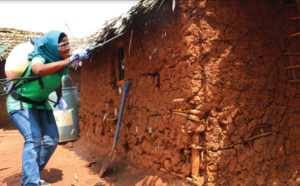Malaria remains a major health hazard in the developing world even today. Dengue has also seen multiple fatalities in many countries, including India. So Vectrax, a U.S.-India Science and Technology Endowment Fund-supported product, promising a cost-effective and sustainable solution to the problem is good news. Paromita Pain reports
Advances in science are often about challenging dominant paradigms. Agenor Mafra-Neto knows this well.
He is the chief executive officer of the California-based ISCA, an agricultural biotech company that brings new, effective and inexpensive solutions to global agriculture.
His research has led to the creation of Vectrax, an eco-friendly and sustainable solution to fight the hazard of disease-bearing mosquitoes in both urban and rural settings.
“In the early 2000s, my brother and sister, who lived in large cities in Brazil, caught dengue,” says Mafra-Neto.
“How could they catch dengue in the middle of a city?
That got me thinking about how difficult it is to control the breeding of mosquitoes in urban areas.

”Mosquitoes are vectors that may carry and transmit several harmful diseases to humans and animals through their bites.
Mafra-Neto, who holds doctoral and postdoctoral degrees in entomology/chemical ecology, started looking into the field of mosquito control and realised that there was “very little innovative thinking” when it came to chemical ecology.
“At that time, there was a dogma stating that female mosquitoes feed only on blood and males feed only on sweet excretions from plants,” he says.
Attract and kill
Intrigued, Mafra-Neto took a fresh look at what attracted mosquitoes in the first place.
“We saw that adult mosquitoes, both male and female, use plant nectar as fuel for their various activities,” he says.
“We started working on scents and different compounds that mimic odours of plants providing these nectar meals to mosquitoes.”
This research led Mafra-Neto’s team to create Vectrax, a patented odour-based solution that mimics the scents of plants mosquitoes feed upon, attracts and effectively eliminates the pests.
Recently, the project received funding from the U.S.-India Science and Technology Endowment Fund (USISTEF).
The fund supports research and development to generate public good, through the commercialisation of technology developed as part of sustained partnerships between U.S. and Indian researchers and entrepreneurs.
In association with the Telangana-based ATGC Biotech, Mafra-Neto was able to test the efficacy of Vectrax in Hyderabad.
Mafra-Neto was introduced to Markandeya Gorantla, chairman and managing director of ATGC Biotech, through his colleagues from Cornell University.
“The pheromones [chemicals that affect insect behaviour] are expensive to manufacture,” says Gorantla.
“ATGC Biotech specialises in this area, and we have the capacity to cost-effectively manufacture such chemical compositions. So, the collaboration was very useful.”
Eco-conscious and
sustainable
While developing the product, the team was very careful to ensure that using chemicals to modify the behaviour of insects did not affect other beneficial insects like bees.
“We wanted a product that could be sprayed as an ‘attract-and-kill’ application, rather than only as an attractant for traps and other devices,” says Mafra-Neto.
Conventional pest control techniques usually use harsh chemicals that need to be sprayed on every inch of an area to ensure there are enough toxic surfaces for the mosquitoes to land on and die.
But this spraying is often uneven, leading to areas with unequal doses of toxic chemicals, which allows mosquito populations to build up resistance to pesticides.
However, Vectrax works differently.
“We create numerous point sources or hotspots in the area where Vectrax is applied, and this attracts mosquitoes to the point source where they encounter the right dose of pesticide that, then, kills them,” explains Gorantla.
“This means using significantly less insecticide per treated area.
Thus, the impact on the environment is very low.” He adds that the effect lasts over several months.
Tried and tested
Vectrax has already been field-tested for several years in Africa and South America.
“Vectrax can be a game changer for developing nations fighting diseases such as malaria and dengue,” says Mafra-Neto. It can be safely used in both urban and agricultural areas.
As Gorantla emphasises, urban pest management is an important concern in India. Vectrax was used in the Golconda Fort area, which was successful in reducing about 70 percent of the mosquito numbers.
“India has very strict regulations concerning the use of insecticides, so we were allowed to use Vectrax in a limited area.
But if we were allowed to treat the whole area of the fort, we could have reduced the mosquito menace even further,” says Gorantla.
With the aid of the USISTEF grant, ISCA will now be able to extensively test the product in Indian conditions.
This, in turn, will help it meet regulatory specifications and register the product in India.
ISCA’s plans involve working toward bringing more products like Vectrax to the market, scaling up manufacturing and improving distribution. (SPAN-TWF)



